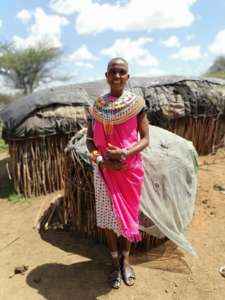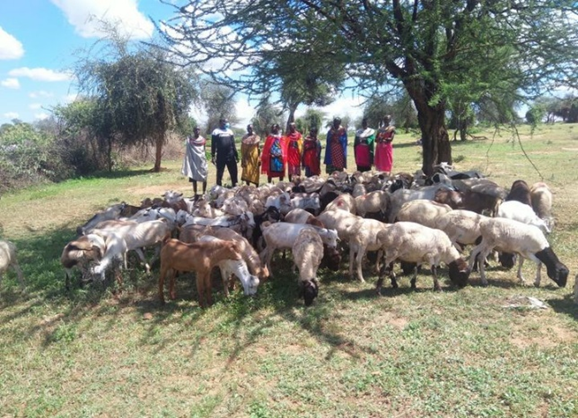 A small Manyatta stands in the middle of a fence surrounded by a fence made of thorns. A woman opens the door to her small home. Like she does every morning, she gazes at the orange hues in the sky as the sun rises. Dawn is when she likes to contemplate the incredibly busy day that lies ahead. It’s also when she marvels at the unexpected trajectory that her life has taken.
A small Manyatta stands in the middle of a fence surrounded by a fence made of thorns. A woman opens the door to her small home. Like she does every morning, she gazes at the orange hues in the sky as the sun rises. Dawn is when she likes to contemplate the incredibly busy day that lies ahead. It’s also when she marvels at the unexpected trajectory that her life has taken.
As a young girl, Agnes Lekupe was always told that women were responsible for all household duties. Women raised children, fetched water, and cooked food. Over the years, Agnes began to live out this life that had seemingly been written out for her. She became the mother of five children. She fetched the water. She became responsible for household-related work.
Today, Agnes is responsible for household duties, But she’s also responsible for a business. Over the last two years, she has become an entrepreneur.
She is the owner of a livestock trading operation. She buys and sells goats for a living. It’s why she wakes up at sunrise. There’s just so much to be done in the day. Even as the residents of Louwa village are asleep, Agnes makes breakfast for her children. She then rushes to the local livestock market.
The road is treacherous and extremely slippery – the unseasonal rain has made the land rife with mudslides. But Agnes is not deterred. The lack of options has filled her mind with a single-minded determination. She has to make it to the market on time to buy a healthy goat.
The Road to Becoming an Entrepreneur
Ten years ago, it would have been unthinkable for a woman like Agnes to become a business owner. In her patriarchal community, men provided for the family. Women performed household duties. However, as the weather changed due to shocks caused by climate change, so did societal expectations.
Due to periodic cycles of floods and droughts, local grazing lands have been devastated. Men can be gone for months upon months in search of pasture. Women are left behind in the village with their children. To support their households, women are defying gender expectations. They are increasingly starting new businesses.
“Over the years, all the people in my village have heard of the BOMA Project. BOMA has gone into communities and made so many women into successful entrepreneurs. We hear stories of women making money for their families. The men in our village have become more open to the idea of women running businesses.” — Agnes Lekupe
The transformative effects of BOMA’s work are readily visible. Only a few years ago, women weren’t allowed to run businesses. Today, over forty percent of traders at a livestock market are women like Agnes, many of whom employ men!
Starting the businesses
Agnes enrolled with the BOMA project in May 2018. Along with two other women, she formed a BOMA business group.
“Being part of a group means that we can divide up responsibilities,” says Agnes. “We can do lots more with our very limited time.”
Agnes and the members of her group received $300 to start a livestock business. Over a two-year period, BOMA’s mentors provided her with business and life-skills training. Financial training sessions covered areas like supply and demand, profit and pricing, record keeping, and marketing. Life-skills sessions included household decision-making, the importance of educating children (especially girls), family planning, and the rights of women under the Kenyan constitution.
Getting connected to the larger market

The Naserian Savings Group along with their livestock
As part of BOMA’s program, business groups come together to form savings groups. Savings groups allow women entrepreneurs to come together to put away money for unexpected future needs. Especially critical, every savings group is registered with the County Social Services, which facilitates access to formal financial institutions and opportunities that might not be available otherwise.
BOMA’s mentors connected Agnes’ “Naserian” savings group to the Women Enterprise Fund – a semi-autonomous Kenyan government agency that provides accessible and affordable credit to support women businesses. The Women’s Enterprise Fund is funded by a partnership between the Kenyan government and the World Bank.
Agnes’ savings group had been extremely disciplined when it came to savings. They were able to pay the required 5% contribution which qualified their group to receive a grant in form of assets. In return, they received 120 goats from National Agricultural and Rural Inclusive Project (NARIGP).
Members of the group began to buy and sell livestock at the local market. There was no shortage of customers.
“Women are better than men when it comes to running a business,” says Agnes. “We are more flexible. We know how and when to negotiate.”
The group’s business has flourished. To keep up with the demand, while being able to run the operational aspects of the business, they hired a herder to take care of the cattle. Hiring a man to take care of the cattle has freed the women up to take care of record keeping, marketing and digital banking.
The members of the group have recognized Agnes’s determination, attention to detail and business savvy. They elected Agnes to be the leader of the group.
“I now understand what it is to be an empowered woman,” Agnes says. “My views matter. My decisions make a difference.”
The BOMA Project has empowered 35,000 women like Agnes to start new businesses, move out of poverty and evolve into leaders in their communities. These women demonstrate the power of BOMA’s approach – when you support the BOMA Project, you don’t just provide aid. Instead, you empower a woman to transform her life, and the lives of her children.
An analysis of a cohort funded by the Bill and Melinda Gates Foundation found that, from baseline to endline, BOMA’s women entrepreneurs achieve 79% increase in household income and 1,748% increase in savings. BOMA’s women entrepreneurs invest their income in their children: The same analysis found a 154% increase in annual spending on school expenses and 21% increase in girl child school enrollment.
A donation to BOMA is the gift that keeps on giving.
